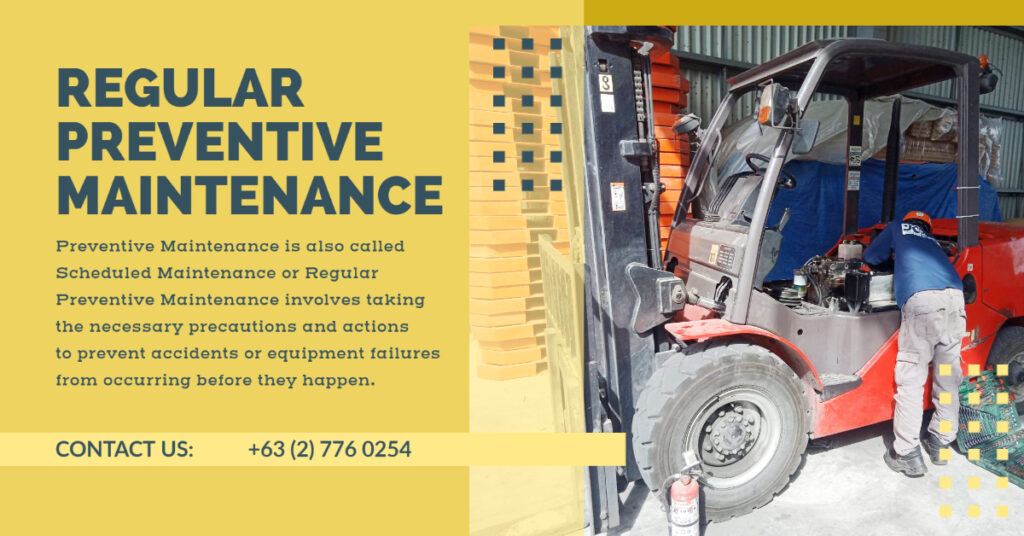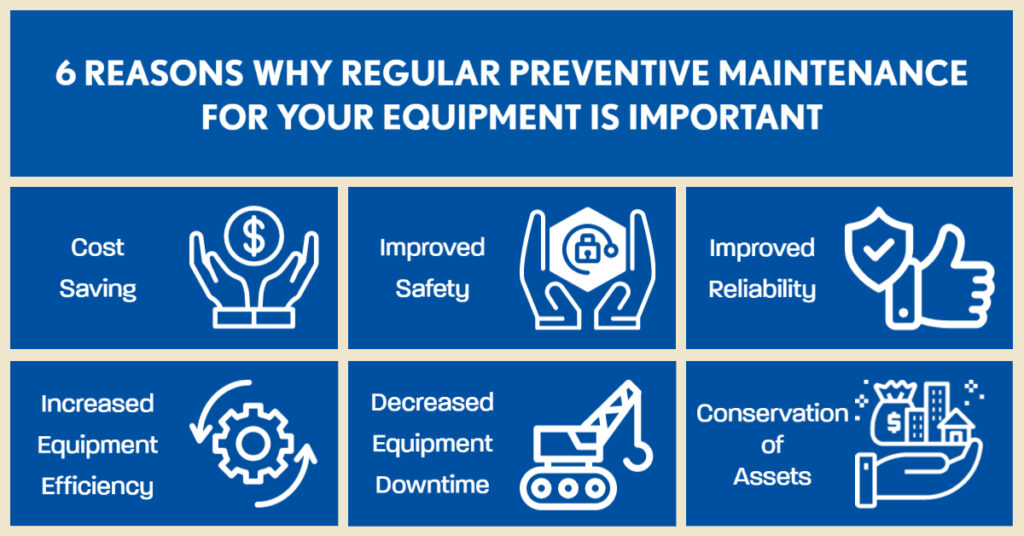What is one of the most cost-effective ways to help ensure lengthen the life of your equipment and minimize repair bills? The answer is regular preventive maintenance.
WHAT IS REGULAR PREVENTIVE MAINTENANCE?

Inspection and maintenance steps are essential to identifying signs of damage or corrosion in the early stages. Proactive care of the equipment minimizes the possibility of an accident, which helps to avoid injury and expensive material damage on the jobsite.
We offer a variety of inspections that satisfy manufacturers’ maintenance recommendations:
Initial Inspection
Inspect equipment for deficiencies and deviations from manufacturer recommendations and applicable standards that may cause a risk to the safe use of your equipment. We do the initial inspection before new equipment is taken into use, or if our own equipment is going to rent after being out of operation for a long period of time, moved to another location.
Daily Inspection
The daily inspection is a user’s (or equipment operator’s) own assessment of the condition of an asset and environment for safe use. This is always applied to our rental equipment every day.
Monthly Inspection
The monthly inspection consists of a more in-depth checkup and is therefore used on a monthly basis for our rental fleet.
Periodic Inspection
The annual inspection of the equipment is a periodic inspection and maintenance performed by our professional maintenance personnel on an annual basis. The annual inspection cycle is one or two years.
Frequent Inspection
Inspect the safety-critical components of equipment between periodic inspections and planned maintenance visits for our distribution equipment.
WHY IS REGULAR PREVENTIVE MAINTENANCE FOR YOUR EQUIPMENT IMPORTANT?

Reason #1 – Cost Savings
Effective preventive maintenance can reduce unnecessary costs that occur because of repairs and can ensure that a technical system does not break down. Especially, a well-maintained crane will last twice as long as one that is neglected and avoids costly emergency repair. Unplanned downtime can result in idle employees, missed deadlines, damage to the reputation and image’s company. An unexpected failure can also mean having to pay technicians overtime and having to pay out extra money for delivery emergency parts. Preventive maintenance is meant to avoid these problems and is usually much cheaper and faster than responding to emergencies.
Reason #2 – Improved Safety
When equipment isn’t working in optimal condition, it creates many hazards, unsafe working conditions, and even emergency situations where workers are injured. Preventive maintenance improves the safety of equipment and therefore the safety of company workers resulting in fewer on-the-job injuries and accidents.
Reason #3 – Improved Reliability
Inconsistency with your machine’s performance takes a toll on your efficiency. With preventive maintenance, you can count on the machine to run whenever you need it, so it’s more reliable.
Reason #4 – Increased Equipment Efficiency
All equipment breaks down due to normal wear and tear. Using a preventive maintenance program in your facility will also keep machines in good working condition. Part replacement, fluid and oil changes, and quality inspections make sure everything works as it should. Equipment that is running efficiently uses less energy and resources than neglected machines, which, in turn, lowers your company’s power costs. This also extends the life cycle of equipment and increases the performance of your facility. Machines break down less often, and small part replacements often reduce the need for large-scale equipment overhauls. And because the equipment you use isn’t cheap, taking better care of it lets you get more hours out of each item — leading to increased profit and decreased costs.
Reason #5 – Decreased Equipment Downtime
You never know when equipment might fail, reactive maintenance results in unplanned downtime, which leads to idle employees, a halt in production, and missed deadlines. To get business back up and running as quickly as possible, these unexpected breakdowns will usually require paying a technician overtime and overnighting parts. A preventive maintenance program keeps the disruption of operations to a minimum. Decreasing equipment downtime is a benefit that saves time in maintenance and day-to-day operations.
Reason #6 – Conservation of Assets
Most equipment these days is certainly not cheap, but the better a company cares for its equipment, the longer it will last. Preventive maintenance will prolong the life of equipment so a company can get more hours out of the equipment, resulting in reduced costs and increased profit.
WHAT ARE THE TYPES OF MAINTENANCE PROGRAMS WE OFFER?
Planning maintenance in advance is important to maintaining the quality of the equipment in order to maximize uptime while optimizing costs and resources. A maintenance process must be safe and regulatory compliance with the manufacturer’s requirements. We offer plans for you to find the maintenance program that best fits your needs.
Plan-1: On-demand Services
Whenever you need to inspect or maintain your equipment, contact Mayon Machinery.
Plan-2: Managed Maintenance
We will customize a service and maintenance program to proactively handle your needs.
Plan-3: Onsite Program
A comprehensive program that maximizes the benefits based on your site’s needs including:
- Maintenance Services
- Parts & Material Management
- Fleet Advisory Services
Preventive maintenance can be as complicated, or as simple if you rely on Mayon Machinery. We’re here to help you keep equipment running smoothly and avoid costly repairs that suddenly take it out of service. Our maintenance program will contribute to a safer, more successful business in the long run for your company!
